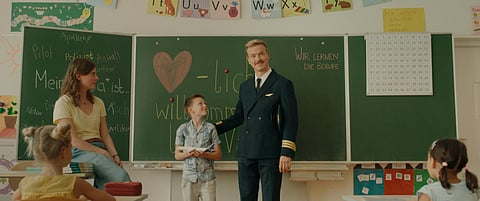

Austrian filmmaker Bernhard Wenger’s debut feature Peacock shares its quirky gene pool with Swedish filmmaker Ruben Östlund’s works in that it’s a sharp observation and incisive critique of the contemporary civilization and culture and a thoughtful exploration of the human predicaments and individual anxieties stemming from it.
The object of Wenger’s curiosity, however, goes beyond just the world of the privileged and the rich and the famous. In fact, its premise took me back more specifically to Amrita Bagchi’s much-appreciated “family members for hire” Indian short film Succulent.
Peacock is inspired by the rent-a-friend agencies in Japan but rooted in a larger existential crisis—the inability to form human connect, the resultant lack of communication, sense of exile and loneliness among individuals and having to take recourse to pretence to plug that vital gap in lives. Giving them a helping hand is a Vienna-based company called My Companion from where they can rent any relation—father, son, boyfriend, husband—for a stipulated period of time. The employee, who is most proficient in wearing these multiple masks, Matthias (Albert Schuch) believes that “good service is its own reward”. But while donning a new face every day, he can no longer remain in touch with himself. He stops being himself as the fictional personae overwhelm the real person.
The Austria-Germany co-production that premiered in the Critics’ Week sidebar at the Venice Film Festival last year is Austria’s entry for the Best International Feature Film at the upcoming Oscars.
What’s most interesting and singular about it is how the writing and its visualization blurs the line that separates the real from the pretense. From being an erudite companion at a concert, becoming a pilot father at a school event to impersonating the boyfriend to help a man get a house lease—it becomes difficult, as a viewer, to disconnect Matthias’ personal life from those of the multiple roles he plays for the others. They just flow into each other and become one on screen. It’s what riles his girlfriend Sophia (Julia Franz Richter)—the prioritisation of playacting and serving others over living and loving for himself. “You don’t seem real any more,” she says. While she decides to up and leave, helping a client learn how to spar with her husband has some unfortunate consequences for Matthias. Nothing helps, be it a yoga retreat or a rented pup. Life goes into disarray hurtling towards utter pandemonium, even as he finds himself in shambles trying to be the perfect son to a demanding rich businessman at his 60th birthday party.
The script is smart and witty that moves between silences and conversations. It builds well on situational humour as well as Matthias’ increasing anxiety. Wenger’s satire is great fun and gentle and agreeable. However, the finale, reminiscent of the tale of “emperor’s new clothes” as well as Östlund’s Palme d’Or winner The Square in its combination of installation and performance art, turns ballistic with its takedown of the polite society, its pretentiousness, pomposity and entitlement and of people who are like preening peacocks.
Albert Schuch’s absurdist turn is the core strength of Peacock. You laugh at him and are moved by his character’s crises as well. From deadpan to sullen to wordlessly indignant, he is astute and inventive in traversing the gamut of emotions as Matthias, the programmed mask-man who is essentially just another lost soul like many others in the world, searching hard for their own meaning in life. Whether they’ll find it is anybody’s guess. Peacock holds a mirror to each of us and the world at large.